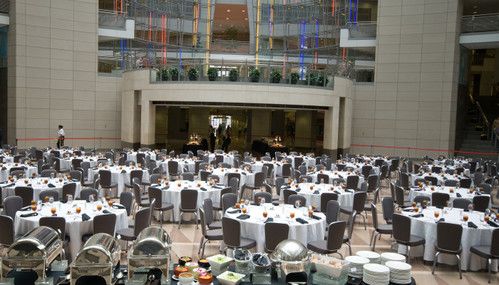The Henry Logan Starks Scholarship Luncheon and Awards Ceremony
River City Rising
As I am writing this blog post our Jewish brothers and sisters are preparing for the start of Passover (Friday, March 30), our Christian brothers and sisters are preparing for Easter and its accompanying holy days (beginning with Holy Thursday on March 29) and Memphis Theological Seminary is preparing to host its 31st Annual Dr. Henry Logan Starks Scholarship Luncheon and Awards Ceremony. It is an important week for people of various faiths and for an institution that prepares those who have embraced their faith to be leaders in their communities. For them, the primary focus is not necessarily to be preachers of God’s Word (though many certainly are- and will be) but living examples of the fruit of the Spirit with missions rooted in love, peace, patience, kindness, and gentleness.

Behind the walls of the beautiful Newburger Mansion which sits on East Parkway in Memphis, Memphis Theological Seminary (MTS) embraces a student body void of “age, gender, economic, cultural, theological or racial barriers.” Men and women who study at the seminary are being prepared for Christian ministry, yes, but they are also taught the importance of being intricate members of our community and connecting with others residing therein, regardless of their religious convictions. It is about so much more than theology, here. I have walked the halls of MTS and looked at art exhibits by an Artist-in-Residence, there because of the seminary’s Theology and Arts Program. I have attended fundraisers that benefited both MTS students, through scholarship endowment growth, and- very intentionally so- locally owned, African American businesses that worked behind-the-scenes to ensure these fundraisers were a success.
In a city still marred by issues of race and economic disparity, MTS’ Henry Logan Starks Institute on Faith, Race, and Social Justice seeks to “make MTS the focal point at the much needed intersection of theological discourse, faith and its impact on race relations, poverty, and other relevant social issues.” Its director, Dr. Rosalyn Nichols, is a fixture in the Memphis community and has fought relentlessly for the rights of the oppressed from every sector of our society. On Sundays she teaches from the pulpit and on the days following until the next Sunday commits to being an example of what she has taught. There are others like her at MTS, who have used their servant’s hearts to show love, patience, kindness, and gentleness to those who are homeless, drug-addicted, depressed, incarcerated. Because no matter our struggles or shortcomings we are still worthy of being shown the fruit of the Spirit: this is, indeed, where faith and life intersect.
The next several days will be filled with solemn self-reflection and commemoration as many of us consider the great sacrifices that were made for our freedoms. As a Christian I will reflect on Christ’s death on the cross for my sins. Jews will reflect on their freedom as a people, led by the prophet Moses, after God liberated them from slavery in Egypt. Thereafter, I believe, will be a continued self-reflection on how we can honor the freedoms with which we’ve been blessed and honor those who died so that we might have life. While for many of us these reflections are heaviest during what we consider the holiest days of the year, I imagine that for the faculty, staff, and students at MTS they are a focus year-round. Ministry here is not exclusive to those whom they see and sit next to at the seminary but inclusive of everyone with whom they cross paths: their self-reflection a daily constant evident by all they have done- and continue to do- throughout our community.
The next several days will be filled with solemn self-reflection and commemoration as many of us consider the great sacrifices that were made for our freedoms. As a Christian I will reflect on Christ’s death on the cross for my sins. Jews will reflect on their freedom as a people, led by the prophet Moses, after God liberated them from slavery in Egypt. Thereafter, I believe, will be a continued self-reflection on how we can honor the freedoms with which we’ve been blessed and honor those who died so that we might have life. While for many of us these reflections are heaviest during what we consider the holiest days of the year, I imagine that for the faculty, staff, and students at MTS they are a focus year-round. Ministry here is not exclusive to those whom they see and sit next to at the seminary but inclusive of everyone with whom they cross paths: their self-reflection a daily constant evident by all they have done- and continue to do- throughout our community.